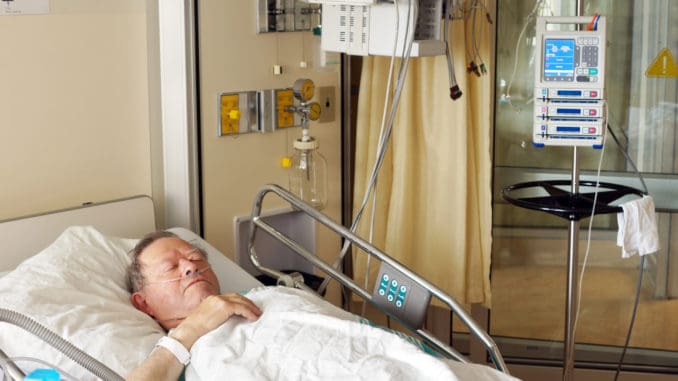
If any of your family or friends ever end up in the hospital, this may help…
—-Important Message From Our Sponsor—-
TIME magazine: “shoelace secret” is making men perform 30 years younger

Get back that energy and vitality you had a young man… with great health and great performance…
…thanks to Molecular Biologist Elizabeth Blackburn’s new “shoelace” discovery.
Scientists are calling it the fountain of youth. Even TIME Magazine declared her discovery:
“The closest we may come to identifying a biological clock – and our best bet for learning how to stop or turn back that clock.”
So if you’re worried about old age affecting your joints, memory, skin, or any other part of your body…
…or if you’re sick and tired of feeling worn out all the time…
———-
This one hormone can keep loved ones from dying in hospital
Nothing is as stressful as needing to be rushed to the hospital.
And deaths in the hospital are strikingly common. Especially in the ICU.
A recent study looked at factors predicting survival in the intensive care unit (ICU).
The researchers looked at blood sugar control and thyroid hormone markers.
The results show that the active thyroid hormone is the best predictor of survival in the ICU.
Thyroid hormone dominates the metabolic rate – something you must optimize to stay healthy and live your potential.

The human study took place at the Department of Endocrinology, Command Hospital, Lucknow, India. The Indian Journal of Endocrinology and Metabolism published the findings.
During stressful situations, hormone levels become altered.
“Stressful situations affect all endocrine axes and differ in the response during acute and chronic phases of stress.”
There are many different theories about the reasons why these hormone levels change when people are ill or stressed.
“The physiological rationale behind these alterations is to change the internal milieu of the organism, helping to fight the external threat to the homeostasis.”
However, there is finally some agreement that altered hormone levels can have detrimental consequences in disease.
“The hormonal alterations may overshoot the boundaries in some individuals leading to deleterious consequences.”
During these stressful periods we see an increase in the stress hormone cortisol – while the protective thyroid hormones and androgens dip.
“Low circulating thyroid hormones with hypogonadism and high cortisol are the predominant changes in acute stress.”
This study set out to test the predictive ability of thyroid hormones and outcomes in patients admitted to the ICU.
“Studies have reported that low thyroid hormones are independent predictors of mortality in patients admitted to intensive care units, suggesting the inclusion of the thyroid profile in these scoring systems.”
The researchers used the three most common thyroid labs:
- TSH – is not a thyroid hormone but it has some ability to predict thyroid hormone levels
- T4 is the storage form of thyroid hormone
- T3 is the active thyroid hormone itself
The researchers used data from 100 patients admitted to the intensive care unit. There were 52 men and 48 women.
The participants of the study were admitted for various different health conditions, ranging from cardiovascular disease to poisoning.
The researchers excluded people with known thyroid problems, and those on thyroid-altering medications.
“100 consecutive patients (52M; 48F) admitted to the medical intensive care unit irrespective of diagnosis were included.“
64 patients survived, and 36 passed away in the ICU.
“A total of 64 patients survived, whereas the remaining 36 succumbed to their illness.”
All participants had blood tests when they were admitted to the hospital.
These tests looked at their thyroid labs and a number of other tests the researchers were interested in.
“Blood samples obtained at admission were analyzed for T3, T4, TSH, HbA1c, and prolactin.”
The researchers found that patients with low levels of T3 were much more likely to die.
The average levels of active thyroid hormone in the blood were lower in non-survivors.
“Non-survivors had low T3 when compared with survivors (49 vs 66).”
The active thyroid hormone (T3) was the only test that predicted the likelihood of survival in this study.
Other thyroid labs (T4 and TSH) were irrelevant, as were HbA1c and prolactin. (Prolactin is a well-known marker of stress.)
“There was no significant difference observed between survivors and non-survivors with respect to T4, TSH,, and prolactin.”
People who enter the ICU with higher levels of active thyroid hormone have a much greater chance of survival.
“Our study showed that low T3 is an important marker of mortality in critically ill patients.”
Thyroid hormone levels should be tested in anyone with chronic health issues.
Diet and lifestyle techniques can improve thyroid hormone levels for many people.
Some people will need thyroid hormone supplementation – paying close attention to T3 levels in particular.
You should always consult a healthcare practitioner about diagnosing and treating any diagnosing health-related problems.
Unsupervised T3 supplementation can be dangerous.
—-Important Message From Our Sponsor—-
3 simple steps to getting rock-solid throbbing boners

The lid’s just been blown on one of the biggest secrets in the “adult” movie industry.
Top star Aaron Wilcoxxx has released this video showing men how to get and stay rock-solid for 30 minutes to an hour…
…WITHOUT pills or any chemicals at all…
This is something any “regular” guy can take advantage of — use it to give your wife or girlfriend pleasure all night long.
>> 3 steps to getting rock-solid throbbing erections (“adult-star” approved) <<
———-
